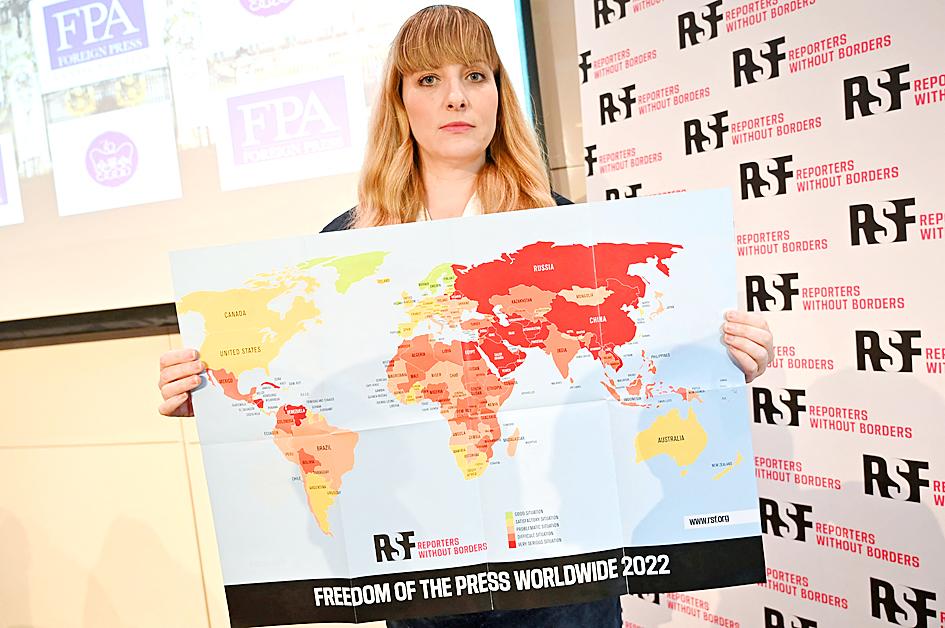Despite Taiwan moving up five places to No. 38 in the World Press Freedom Index released yesterday by Reporters Without Borders (RSF), the organization said more needed to be done to address a “toxic” working environment for journalists.
Taiwan’s ranking placed it fourth in the Asia-Pacific region, behind New Zealand (11th), East Timor (17th) and Bhutan (33rd), but ahead of Australia (39th) and South Korea (43rd).
Taiwan was among the 40 countries listed in the index as having a “satisfactory” media environment.

Photo: AFP
The index’s top three spots went to Norway, Denmark and Sweden in that order, with the three Nordic countries considered to have a “good” media environment.
Commenting on the latest index, Cedric Alviani, head of RSF’s East Asia Bureau, said the change in Taiwan’s ranking did not reflect the nation’s improvement, but was rather the result of a modified way of compiling the index.
“This year, Taiwan moving up five ranks does not reflect any significant improvement in terms of press freedom,” Alviani told the Central News Agency during a telephone interview yesterday. “So the movement is purely due to the new system we used to make the index.”
This change of criteria enabled the index to better reflect the current press freedom situation of every country, Alviani said.
While Taiwan has a favorable ranking, its press freedom situation has been “impaired” by some “serious problems,” he said.
Political polarization and the sensational approach that Taiwanese media take to report certain news pose an “obstacle” to the public getting factual and objective information, Alviani added.
RSF had for the past year repeatedly called on the government to take some measures to address these problems, such as providing serious funding for public broadcasters without compromising their editorial independence, he said.
He also said the working environment for journalists was “quite toxic” and that such a situation continued to impact Taiwan’s press freedom.
Many young journalists have changed jobs after a few years of work because they were underpaid and overworked, and because it was not possible for them to do quality reporting as they had been expected to do, Alviani said, citing RSF’s past interviews and discussions with Taiwanese journalists.
In East Asia, the press freedom situation is “getting worse,” he said.
In particular, the ranking of Hong Kong showed “one of the biggest downfalls ever in our index over the past 20 years,” Alviani said.
Hong Kong ranked 148th in this year’s index, slipping 68 spots from No. 80 in the previous ranking.
“One could be afraid that in a few years, let’s say before the end of the mandate [of the Sino-British Joint Declaration], freedom of the press in Hong Kong would be no better than freedom of the press in the rest of the country,” he said, referring to China, which finished at 175th in the index.

AGING: As of last month, people aged 65 or older accounted for 20.06 percent of the total population and the number of couples who got married fell by 18,685 from 2024 Taiwan has surpassed South Korea as the country least willing to have children, with an annual crude birthrate of 4.62 per 1,000 people, Ministry of the Interior data showed yesterday. The nation was previously ranked the second-lowest country in terms of total fertility rate, or the average number of children a woman has in her lifetime. However, South Korea’s fertility rate began to recover from 2023, with total fertility rate rising from 0.72 and estimated to reach 0.82 to 0.85 by last year, and the crude birthrate projected at 6.7 per 1,000 people. Japan’s crude birthrate was projected to fall below six,

Conflict with Taiwan could leave China with “massive economic disruption, catastrophic military losses, significant social unrest, and devastating sanctions,” a US think tank said in a report released on Monday. The German Marshall Fund released a report titled If China Attacks Taiwan: The Consequences for China of “Minor Conflict” and “Major War” Scenarios. The report details the “massive” economic, military, social and international costs to China in the event of a minor conflict or major war with Taiwan, estimating that the Chinese People’s Liberation Army (PLA) could sustain losses of more than half of its active-duty ground forces, including 100,000 troops. Understanding Chinese

SELF-DEFENSE: Tokyo has accelerated its spending goal and its defense minister said the nation needs to discuss whether it should develop nuclear-powered submarines China is ramping up objections to what it sees as Japan’s desire to acquire nuclear weapons, despite Tokyo’s longstanding renunciation of such arms, deepening another fissure in the two neighbors’ increasingly tense ties. In what appears to be a concerted effort, China’s foreign and defense ministries issued statements on Thursday condemning alleged remilitarism efforts by Tokyo. The remarks came as two of the country’s top think tanks jointly issued a 29-page report framing actions by “right-wing forces” in Japan as posing a “serious threat” to world peace. While that report did not define “right-wing forces,” the Chinese Ministry of Foreign Affairs was

US President Donald Trump in an interview with the New York Times published on Thursday said that “it’s up to” Chinese President Xi Jinping (習近平) what China does on Taiwan, but that he would be “very unhappy” with a change in the “status quo.” “He [Xi] considers it to be a part of China, and that’s up to him what he’s going to be doing, but I’ve expressed to him that I would be very unhappy if he did that, and I don’t think he’ll do that. I hope he doesn’t do that,” Trump said. Trump made the comments in the context